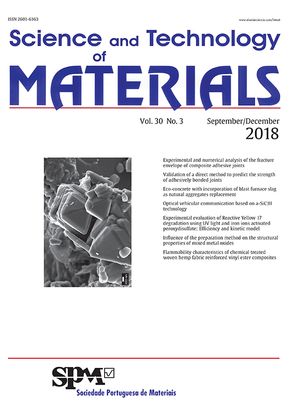Maritime Pine softwood has low dimensional stability. Chemical modification is the easiest way to improve technological features of the softwood into a material with enhanced and less varied properties. In this work, physical properties of modified wood using four methods of modification were studied. Pure sapwood of the Maritime pine species (Pinus pinaster Ait.) was submitted at different chemical modification processes: 1,3-dimethylol-4,5-dihydroxyethyleneurea (DMDHEU), N-methylol melamine (MMF), tetra-alkoxysilane (TEOS) and wax (amid WA and montan/lignite wax WL). The following physical properties were assessed experimentally: density and weight percent gain (WP), equilibrium moisture content (EMC), isotherms curves, anti-swelling efficiency (ASE), swelling strain and swelling coefficient. Significant changes in the material properties took place. All modification processes increased the density of modified wood in different extent: Modification with cell wall reaction (DMDHEU and MMF resin) were the most effective methods to achieve high dimensional stability (ASE) in parallel with low equilibrium moisture content (EMC). The lumen fill modification (TEOS and wax) had no effect in to different physical properties.
Información de la revista
Vol. 25. Núm. 2.
Páginas 121-128 (julio - diciembre 2013)
Vol. 25. Núm. 2.
Páginas 121-128 (julio - diciembre 2013)
Acceso a texto completo
Physical properties of Portuguese pinewood chemically modified
Visitas
1413
Este artículo ha recibido
Información del artículo
Abstract
Keywords:
chemical modification
equilibrium moisture content
anti-Swelling efficiency
shrinkage
swelling
El Texto completo está disponible en PDF
References
[1]
R.M. Rowell, Chemical modification of wood: a review. Commonwealth Forestry Bureau, Oxford, v.6, n.12, p.363-382, 1983.
[2]
C.A.S. Hill, Wood modification chemical, thermal and other processes. John Willey & Sons, Ltd, England, ISBN 13:978-0-470-02172-9, 2006.
[3]
M. Norimoto, J. Gril, R.M. Rowell.
Wood Fiber Sci., 24 (1992), pp. 25-35
[4]
H. Militz.
Wood Sci. Technol, 27 (1993), pp. 347-355
[5]
A. Krause, M. Zee, D. Jones, H. Militz, Proceedings of the 1st European Conference on Wood Modification, Ghent Belgium, 2003, pp. 319-324.
[6]
S. Schaffert, A. Krause, H. Militz, Proceedings of the 2nd European conference on wood modification, Göttingen, Germany, 2005, pp. 161-168.
[7]
F. Wepner, H. Militz, Proceedings of the 2nd European conference on wood modification, Göttingen, Germany, 2005, pp. 169-177.
[8]
S. Bollmus, Biologische und technologische eigenschaften von buchenholz nach einer modifizierung mit 1,3-dimethylol-4,5-dihydroxyethyleneurea (DMDHEU). PhD dissertation, Georg-August-Universitat Goettingen, Germany, ISBN 978-3-86955-653-6 (in German), 2011.
[9]
A.G. Pfeffer, Effect of water glass, silane and DMDHEU treatment on the colonisation of wood by sapstaining fungi. PhD dissertation, Georg-August-Universitat, Göttingen, Germany, ISBN 978-3-86955-653-6, (in English), 2011.
[10]
S. Donath, H. Militz, C. Mai.
Wood Sci. Technol, 38 (2004), pp. 555-566
[11]
H. Epmeier, M. Westin, A. Rapp.
Scand. J. Forest Res, 19 (2004), pp. 31-37
[12]
A. Krause, C. Hof, H. Militz, Proceedings of the 35th International Research Group on Wood Protection IRG/WP 04-40285, Ljubljana, Slovenia, 2004.
[13]
A. Krause, H. Militz, Proceedings of the 2th European Conference on Wood Modification, Göttingen, Germany, 2005, pp. 289-294.
[14]
O. Weigenand, C. Mai, M. Babiak, H. Militz, Proceedings of the 2th European Conference on Wood Modification, Göttingen, Germany, 2005, pp. 295-297.
[15]
A. Krause, F. Wepner, C. Mai, H. Militz, Tor Schultz, Darrel Nicholas, Holger Militz, Michael H Freeman, Barry Goodell (Eds.), ISBN 13: 9780841239517, 2008, Chapter 21, pp. 481-503.
[16]
H. Militz, S. Schaffert, B. Peters, C. Fitzgerald, Proceedings of the 39th International Research Group on Wood Protection IRG/WP 08-40401, Istanbul, Turkey, 2008.
[17]
G. Scholz, A. Krause, H. Militz, Proceedings of the 4th European Conference on Wood Modification, Stockholm, Sweden, 2009, pp. 209-212.
[18]
A. Krause, Holzmodifizierung mit N- Methylolvernetzern. PhD dissertation, Georg-August- Universitat, Göttingen, Germany (in German), 2006.
[19]
EN 84, Determination of leaching of chemical impregnated into wood. European Committee For Standardization, July, 1997.
[20]
C.A.S. Hill, D. Jones.
Holzforschung, 50 (1996), pp. 457-462
[21]
A.N. Papadopoulos, S. Avramidis, D. Elustondo.
Wood Sci. Technol, 39 (2005), pp. 99-112
[22]
M.V. Bastías, A. Cloutier.
Maderas Cienc. Tecnol, 7 (2005), pp. 145-158
[23]
A.J. Hailwood, S. Horrobin.
Trans. Faraday Soc, 42 (1946), pp. 84-102
[24]
Ficha T. M9 Humidade na madeira. Fichas Técnicas, Laboratório Nacional de Engenharia Civil, Portugal (in Portuguese), 1997.
[25]
NP EN 4305, Madeira serrada de pinheiro bravo para estruturas. Classificação visual. Instituto Português da Qualidade, Lisboa – Portugal, 1995.
[26]
R.M. Rowell, in: Rowell RM (Eds.) Chemical modification of lingo-cellulosic materials. Marcel Dekker, New York, 2005, pp. 77-98.
[27]
R.M. Rowell, in: Rowell RM (Ed.) Chemical modification of lignocellulosic materials, Marcel Dekker, New York, 1996, pp. 295-310.
[28]
A. Dieste, Wood water relationships in wood modified with 1.3-dimethylol-4.5-dihydroxyethyleneurea (DMDHEU). PhD dissertation, Georg-August-Universitat Goettingen, Germany, 2009.
[29]
B.M.M.L. Esteves, Melhoramento tecnológico por modificação térmica de madeiras Portuguesas. PhD dissertation, Universidade Técnica de Lisboa, Instituto Superior de Agronomia, Lisboa, Portugal (in Portuguese), 2006.
[30]
H. Epmeier, M. Johansson, R. Kliger, M. Westin.
Holzforschung, 61 (2007), pp. 34-42
[31]
J.A. Santos.
Wood Sci. Technol, 34 (2000), pp. 39-43
[32]
W.J. Homan, F. Bongers, Proceedings of the Final Workshop COST Action E22 Environmental Optimisation of Wood Protection, Estoril, Portugal, 22-23 March, 2004.
[33]
S. Lande, M. Westin, M. Schneider.
Scand. J .Forest Res, 19 (2004), pp. 22-30
[34]
DIN 52182, Prüfung von holz. Bestimmung der rohdichte. Beuth, Berlin (in German), 1976.
[35]
EN 275, Wood preservatives. Determination of the protective effectiveness against marine borers. European Committee for Standardization, July, 1992.
[36]
D.B. Lopes, C. Mai, H. Militz, Mechano-sorptive creep of Portuguese pinewood chemically modified. Unpublished manuscript.
Copyright © 2014. Sociedade Portuguesa de Materiais (SPM)





